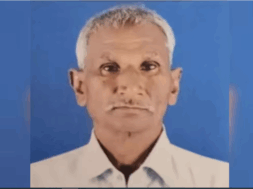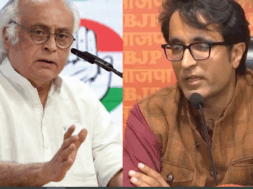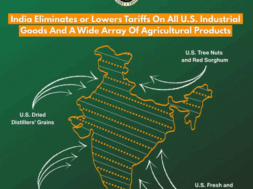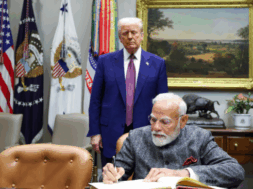
Opposition Criticise – BJP Welcomes New Criminal Laws, Jharkhand HC Finds Error in Printing
Manas Dasgupta
NEW DELHI, July 1: Even as the new “completely swadeshi” criminal laws came into force in the country on Monday, the Jharkhand High Court took suo motu cognizance of an error in Universal LexisNexis edition of the Bharatiya Nyaya Sanhita (BNS) bare act.
A bench of Justices Ananda Sen and Subhash Chand of the Jharkhand High Court pointed out that in one of the editions the provision for lynching — BNS section 103(2) — had been wrongly reproduced.
The Section 103 (2) of the new law reads: “When a group of five or more persons acting in concert commits murder on the ground of race, caste or community, sex, place of birth, language, personal belief or any other similar ground each member of such group shall be punished with death or with imprisonment for life, and shall also be liable to fine.”
The LexisNexis version, however, uses the words “any other ground” instead of “any other similar ground.” Observing that the error could have “serious consequences,” the bench directed the publisher to publish a corrigendum in the national and the regional newspapers.
Ritu Kumar, president of the Jharkhand High Court Advocates’ Association, said, “We were called in the court to deliberate on the issue. The bench has issued a notice to the publisher on the error where a word is missing. The notice will be served to the publishers for action.” Jharkhand High Court lawyer Mohammad Shabad Ansari, who had previously represented lynching victims in various cases, said the words “any other grounds” could mean anything, even property disputes.
Already a petition is going on in the Kerala High Court opposing Hindi names to new laws and many south-based political parties also have been opposing title of new laws as their names are in Hindi.
Besides the court petition, several opposition parties also wanted the government to re-discuss the new laws before it was introduced all over the country. The Congress said these laws were “forcibly” passed by suspending 146 MPs from Parliament proceedings. The party also said 90 per cent of these laws were a “cut, copy and paste job.”
Taking to X, Congress president Mallikarjun Kharge said Prime Minister Narendra Modi and BJP were “pretending to value the Constitution after an electoral and moral setback in the election.” “But the truth is that the new criminal laws that come into force today were passed forcibly by suspending 146 MPs. INDIA will not allow this ‘bulldozer law’ on Parliamentary proceedings anymore,” he added.
The Congress chief was referring to the Winter Session of Parliament that saw the suspension of nearly two-third of the Opposition MPs in both Houses. The mass suspensions had come amid the Opposition’s protest against the Parliament security breach. The new criminal laws cleared the Parliament virtually in the absence of the Opposition.
Senior Congress leader P Chidambaram said 90-99 per cent of the “so-called new laws” are a cut, copy and paste job. “A task that could have been completed with a few amendments to the existing three laws has been turned into a wasteful exercise,” he said. Acknowledging that there are a few improvements, he said these changes could have been introduced as amendments.
“On the other hand, there are several retrograde provisions. Some changes are prima facie unconstitutional. MPs who were members of the Standing Committee have poured over the provisions and written detailed dissent notes to the three Bills. The government did not rebut or answer any of the criticisms in the dissent notes. There was no worthwhile debate in Parliament,” he said.
“Law scholars, Bar Associations, judges and lawyers have in numerous articles and seminars pointed out the grave deficiencies in the three new laws. No one in government has cared to answer the questions,” the Congress leader added.
“It is another case of bulldozing three existing laws and replace them with three new Bills without adequate discussion and debate. The initial impact will be to throw the administration of criminal justice into disarray. In the medium term, numerous challenges to the laws will be instituted in various Courts. In the long term, further changes must be made to the three laws to bring them in conformity with the Constitution and the modern principles of criminal jurisprudence,” Mr Chidambaram said.
The Trinamool Congress MP Derek O’Brien described the new laws as “draconian” and “unconstitutional.” “Some of us from INDIA fought all out on the Parliament Committee,” he said.
Union Home Minister Amit Shah, who led the law revision exercise, has said these laws “are made by Indians, for Indians and by an Indian Parliament and marks the end of colonial criminal justice laws.” He has also said these laws were not just about changing the nomenclature but bringing about an overhaul. “Soul, body and spirit of the new laws is Indian,” he had said. Mr Shah said that while the colonial-era laws focus on penalty, these laws would prioritise justice.
The ruling BJP, however, welcomed the implementation of the new laws and said the new criminal laws were a symbol of India’s progress and resilience, positioning the country for a more just and secure future. The BJP national spokesperson Gaurav Bhatia said the Indian Penal Code (IPC) and the Indian Evidence Act, originating from 1860 and 1872, respectively, were outdated and ill-equipped to address contemporary issues.
“Today is a historic day in the annals of our free country, India. An evolving society needs laws that cater to its needs and demands, protecting its rights,” he said. Bhatia called the new laws a symbol of India’s progress and resilience, positioning the country for a more just and secure future.
Highlighting the comprehensive nature of the new legislation, he underlined several key changes. “In the earlier laws, terrorism had no definition, making it difficult for the prosecution and the police to file charges or prove a case. The new laws have defined terrorism,” Bhatia said. This clarity, he said will strengthen India’s resolve to eradicate terrorism. Bhatia also emphasised the inclusion of mob lynching as a specific offence with the potential for death penalty. He also pointed out the special focus on the rights of women and children.
Addressing broader societal implications, Bhatia said the new laws were symbolic of the fact that a new, resilient India was ready to embrace laws duly enacted by legislators. He positioned this legal transformation as part of a larger narrative of national progress and modernisation. Hitting out at the opposition, Bhatia said, “I am sure they have not even read the three laws, just like they hold the Constitution in their hand but don’t care to read it”. He asserted that the entire nation has come forward to embrace and welcome the new criminal laws.













